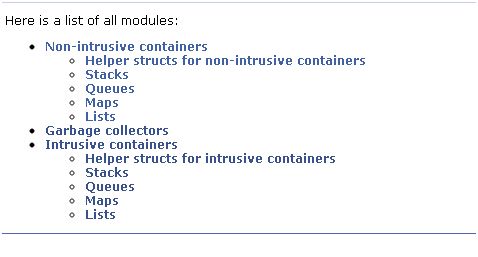无锁(lock-free)容器库libcds的使用指引及调查
写在最前:
(1).libcds依赖boost。Boost的下载、编译可参考博文:http://blog.csdn.net/great3779/article/details/7310392
(2).本文中用到了我自己封装的线程安全容器CWnQueue,可参考http://blog.csdn.net/great3779/article/details/7180383获取。
(3).本文中用到的测时套件TimerKit,可参考http://blog.csdn.net/great3779/article/details/7353028获取。
下面开始对libcds的讨论:
1. 获取:http://libcds.sourceforge.net/其中有源码、文档及论坛等。
2. 开源协议:BSD License
3. 主要功能:提供了lockfree(无锁的)浸入式和非浸入式容器。
非浸入式容器:类似于STL容器,入容器时采用值传递方式;
浸入式容器:入容器时采用引用传递方式。
浸入式容器是非浸入式容器的基类(即浸入式容器是基础,非浸入式容器实现于浸入式容器之上)
从上图可以看出,libcds主要提供了四类容器:Stacks(栈容器)、Queues(队列容器)、Maps(映射表容器)、Lists(链表容器),分别对应STL相对应的容器。
4. 编译:参考http://libcds.sourceforge.net/doc/cds-api/index.html
摘抄如下:
由于我在windows下试用libcds,因此总结一下windows下编译libcds的方法:
(1).编译并配置好boost。(关于boost的编译及配置,可以参考我相关文章:http://blog.csdn.net/great3779/article/details/7310392等)
(2).至cds目录下的\projects\Win子目录,选择相应的解决方案(.sln)。(例如,使用VS2008的朋友,可以打开vc9下的cds.sln)
(3).打开后,会发现其中包含了三个工程,编译cds工程即可。(其他两个工程是cds的单元测试以及hdr测试工程,可以不编译)。
(4).编译完成后,会在cds根目录下生成bin目录,内含cds的dll和lib文件。
(5).在你的demo工程中,引入dll和lib,就可以使用libcds了。
5. 使用示例(以Queues为例,其余容器类似):
(1).使用前准备
libcds文档原文摘抄如下:
First, in your code you should initialize cds library and a garbage collectorin main function:
#include <cds/init.h> // for cds::Initialize and cds::Terminate
#include <cds/gc/hp.h> // for cds::HP (Hazard Pointer) garbage collector
int main(int argc, char** argv)
{
// Initialize libcds
cds::Initialize() ;
{
// Initialize Hazard Pointer singleton
cds::gc::HP hpGC() ;
// Do what you need
...
}
// Terminate libcds
cds::Terminate() ;
}Second, any of your thread should be attached to cds infrastructure.
#include <cds/gc/hp.h>
int myThreadEntryPoint(void *)
{
// Attach the thread to Hazard Pointer singleton
cds::gc::HP::thread_gc myThreadGC() ;
// Do some work
...
// The destructor of myThreadGC object detaches the thread from HP singleton
}After that, you can use cds lock-freecontainers safely without any synchronization.
从文档中可以看出,要使用libcds,主线程需进行三个步骤:
(a). 初始化libcds
cds::Initialize();
(b). 初始化Hazard指针单例
cds::gc::HP hpGC();
(c). 结束libcds
cds::Terminate();
此外,每个子线程的开头需要关联线程至Hazard指针单例
cds::gc::HP::thread_gcmyThreadGC();
(2). Demo程序(小技巧:libcds源码注释中提供了比较详细的类使用方式,例如michael_map.h中就提供了非常详细的使用MichaelHashMap的方法)
#include <cds/init.h> // for cds::Initialize andcds::Terminate
#include <cds/gc/hp.h> // for cds::HP (Hazard Pointer) garbagecollector
#include <cds/container/msqueue.h> // msqueue
typedef cds::container::MSQueue<cds::gc::HP,int> INT_MSQueue;
int main(int argc, char** argv)
{
//Initialize libcds
cds::Initialize();
//Initialize Hazard Pointer singleton
cds::gc::HPhpGC;
//Attach the thread to Hazard Pointer singleton
cds::gc::HP::thread_gcmyThreadGC;
//define queues
INT_MSQueue cds_queue;
//push element to queue
cds_queue.push(33);
//Terminate libcds
cds::Terminate();
}总结一下:
(1).libcds容器的接口不丰富(或不完善)。这导致了实用性下降。
例如:有些容器不提供迭代器,例如MSQueue。或者就算提供了,也不太好用(相对标准STL),例如MichaelKVList的iterator。
上图左侧为STL queue接口,右侧为libcds MSQueue接口。MSQueue没有提供front方法,且size()方法无效(实践中发现其值总为0,也可参考其注释)。此外,enqueue/dequeue方法与push/pop方法有重复之嫌(为接口兼容?)。
(2).最重要的,与我自己封装的线程安全队列CWnQueue相比,性能上不占优势(甚至还更慢,这很难理解!)。
对比如下:
(a).单线程测试(push/pop操作)
int main(int argc, char** argv)
{
//Initialize libcds
cds::Initialize();
//Initialize Hazard Pointer singleton
cds::gc::HPhpGC;
cds::gc::HP::thread_gcmyThreadGC;
{
TKittk;
//Do what you need
intnSize = 10*1000*1000;
//test cds MSQueue
INT_MSQueuearr;
{
TUnittu("cds_queue_push");
RegisterUnit(tu);
for(inti = 0 ; i < nSize; ++i)
arr.push(i);
}
{
TUnittu("cds_queue_pop");
RegisterUnit(tu);
inti;
while(arr.pop(i));
}
//test stl queue
queue<int>arr2;
{
TUnittu("stl_queue_push");
RegisterUnit(tu);
for(inti = 0; i < nSize; ++i)
arr2.push(i);
}
{
TUnittu("stl_queue_pop");
RegisterUnit(tu);
while(!arr2.empty())
arr2.pop();
}
//test CWnQueue
CWnQueue<int>arr3;
{
TUnittu("wn_queue_push");
RegisterUnit(tu);
for(inti = 0; i < nSize; ++i)
arr3.push(i);
}
{
TUnittu("wn_queue_pop");
RegisterUnit(tu);
inti;
while(arr3.pop(i));
}
}
//Terminate libcds
cds::Terminate();
}
测时结果:
从上图测时结果可以看出,cds的单线程push/pop表现均最差,甚至比CWnQueue也慢了不少!
(b).多线程测试(libcds意义所在)
#define TEST_CDS_QUEUE
#ifdef TEST_CDS_QUEUE
INT_MSQueue arr;
#else
CWnQueue<int> arr;
#endif
const int TEST_SIZE = 1000*1000*10;
void Push()
{
TUnittu("push");
RegisterUnit(tu);
#ifdef TEST_CDS_QUEUE
cds::gc::HP::thread_gcmyThreadGC;
#endif
for(inti = 0; i < TEST_SIZE; ++i)
{
arr.push(i);
}
}
void Pop()
{
{
TUnittu("pop");
RegisterUnit(tu);
#ifdef TEST_CDS_QUEUE
cds::gc::HP::thread_gcmyThreadGC;
#endif
inti;
while(1)
{
while(arr.pop(i))
{
if(i== TEST_SIZE-1)
{
cout<< "Finish" << endl;
gotoEND;
}
}
Sleep(100);
}
}
END:
EndTC();
}
int main(int argc, char** argv)
{
//Initialize libcds
cds::Initialize();
//Initialize Hazard Pointer singleton
cds::gc::HPhpGC;
cds::gc::HP::thread_gcmyThreadGC;
{
TKittk;
boost::threadt_push(Push);
for(inti = 0; i < 10; ++i)
boost::threadt_pop(Pop);
Sleep(10*1000);
}
//Terminate libcds
cds::Terminate();
}通过开启/关闭宏TEST_CDS_QUEUE,来分别测试MSQueue和CWnQueue的多线程表现力。测时结果如下:
MSQueue测时结果:
CWnQueue测试结果:
由于STL queue非线程安全,因此没有参与测试。从测试结果看,MSQueue在多线程表现下依旧没有任何优势,甚至表现还不如CWnQueue。而这原本应该是MSQueue的强项所在!
(c).带MSQueue的测试程序,在程序结束后总会报一个错误(Debug/Release下均有,经跟踪,是由于libcds内部获取某线程信息失败导致)。原因不明。不知是否与我的测试环境有关。
附上测试环境
软件环境:
WindowsServer 2003 Enterprise x64 Edition sp2 + VS2008sp1 +Boost1.49.0
硬件环境:
Pentium(R)Dual-Core E5200 + 4.00G + 160G(7200)
结论在最后:
Libcds容器既没有提供完善优雅的接口,在单/多线程下表现也不行(还不如我自己封装的线程安全容器)。似乎不是一个好的解决方案。(这实在是很难令人置信!!!)
(当然,由于测试还比较浅显、粗糙,有很大可能是我对libcds使用方法理解不够充分,从而误解了它。另外,对于浸入式容器,我也没测试,表现应该会比非浸入式容器好。但由于STL容器都是非浸入式容器,并且浸入式容器使用中陷阱很多,因此意义仿佛不是太大。)
最后非常希望有志之士能与我一起讨论libcds或纠正我对其使用/认识上的一些误区。邮件:[email protected]。



